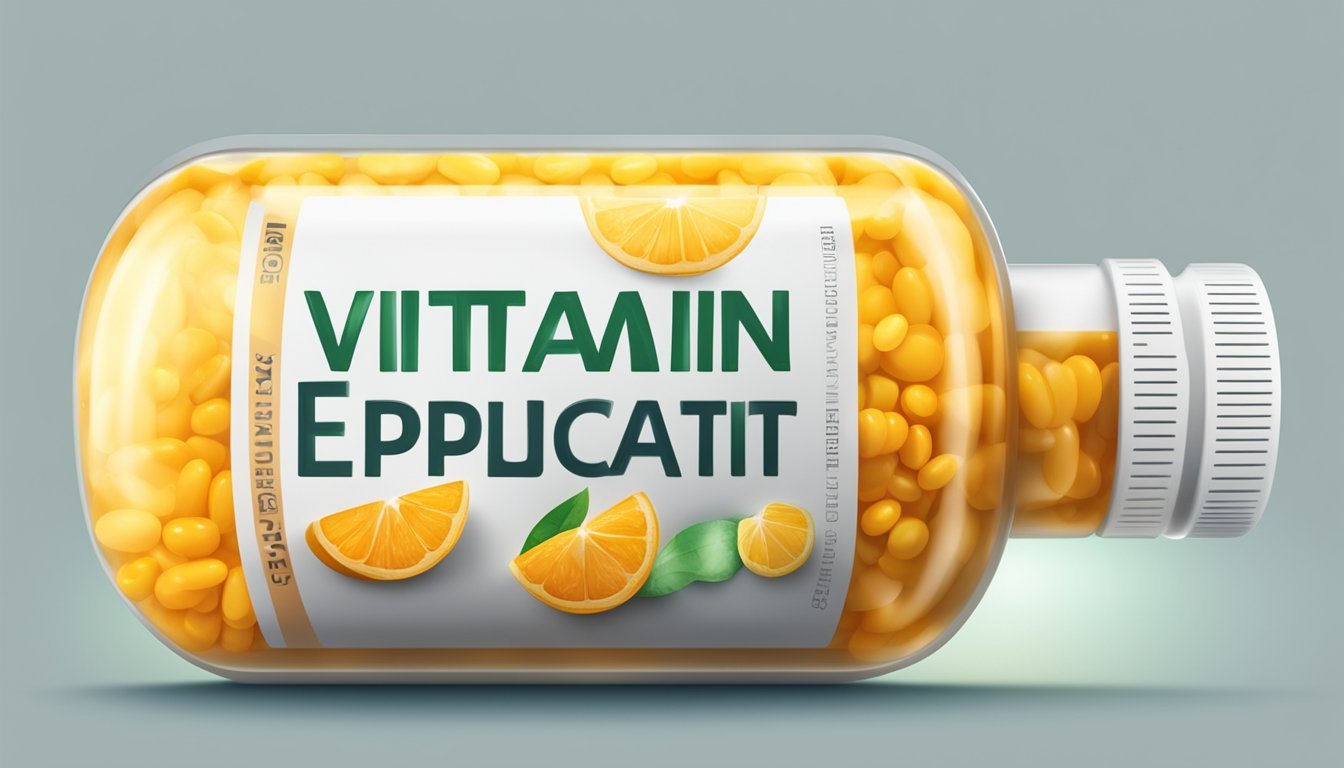How Long Does Vitamin C Last?
Understanding Its Shelf Life and Potency
Vitamin C is a water-soluble nutrient essential to human health, playing a pivotal role in various bodily functions, including the formation of collagen, absorption of iron, and maintenance of the immune system. Given its importance, it’s not uncommon for individuals to turn to supplements to ensure adequate intake. However, when it comes to the shelf life and duration of effectiveness of these supplements, it’s important to be informed.
Supplements, like many other consumable products, come with "use by" or "best before" dates which indicate the timeframe within which they are expected to retain optimal potency. After these dates, vitamin C supplements may lose potency, but are unlikely to be harmful if consumed. The concentration of the vitamin can significantly decrease over time. This is influenced by various factors, including exposure to light, heat, and humidity, which can accelerate the degradation process.
In the human body, the presence of vitamin C is transient due to its water-soluble nature. Once ingested, excess amounts are not stored but rather, excreted through urine, necessitating a consistent intake. The kidneys play a crucial role in regulating the levels of vitamin C by reabsorbing it back into the bloodstream. On average, the half-life of vitamin C in an adult's body ranges from 10 to 20 days, indicating that the body's stores are replenished and turned over within this period.
What Is Vitamin C?
Vitamin C, or ascorbic acid, is an essential nutrient known for its role in maintaining several bodily functions and its presence in various natural sources, such as fruits and vegetables.
Definition and Properties
Vitamin C is a water-soluble antioxidant that the human body cannot synthesize on its own. Structurally, it is a carbohydrate derivative that plays critical roles within the body's cellular processes. As an antioxidant, it helps to protect the body's tissues from oxidative stress and damage by neutralizing free radicals.
Roles in the Body
The human body requires vitamin C for the biosynthesis of collagen, cartilage, blood vessels, and muscles. It is also crucial for the body's healing process. Due to its antioxidant properties, ascorbic acid plays a vital role in supporting the immune system and iron absorption.
Natural Sources
The richest natural sources of vitamin C are fruits and vegetables. Notable examples include:
Citrus fruits: oranges, grapefruits, lemons
Berries: strawberries, blueberries, raspberries
Vegetables: bell peppers, broccoli, spinach
Incorporating these foods into a daily diet ensures an adequate intake of vitamin C to support overall health.
Benefits of Vitamin C
Vitamin C, a crucial nutrient, plays a pivotal role in various bodily functions from bolstering the immune system to aiding in the wound healing process. Recognized for its antioxidant properties, it is essential for maintaining overall health.
Immune Enhancement
Vitamin C contributes significantly to immune defense by supporting various cellular functions of the body's adaptive immune system. It is known to encourage the production of white blood cells, which help protect the body against infection. Moreover, as an antioxidant, it strengthens the skin’s barriers against pathogens.
Collagen Production and Wound Healing
This vitamin is vital for the biosynthesis of collagen, a protein that is the cornerstone of connective tissues in the body. Collagen is integral to the wound healing process, ensuring that injuries repair properly and efficiently.
Iron Absorption
Vitamin C enhances the absorption of iron from plant-based foods and helps convert it into a form that is more easily used by the body. This is particularly beneficial in preventing iron-deficiency anemia.
Prevention of Chronic Diseases
By combating free radicals and limiting oxidative stress, vitamin C may reduce the risk of chronic diseases. Its antioxidant effects are believed to protect against heart disease and may lower the risk of cancer. Additionally, a sufficient intake of Vitamin C has been associated with a reduced risk of kidney stones.
Vitamin C Deficiency
Vitamin C deficiency compromises health, leading to a cascade of symptoms and, if left unaddressed, severe conditions such as scurvy. It is a critical issue that arises from inadequate intake of vitamin C, affecting various bodily functions.
Symptoms of Deficiency
Fatigue: Persistent tiredness can be an early sign of vitamin C deficiency.
Anemia: A shortage of vitamin C can result in a reduced ability to absorb iron, leading to anemia.
Bleeding gums: Without sufficient vitamin C, gum health deteriorates, often causing bleeding.
Risk Factors
Dietary Habits: Insufficient consumption of vitamin C-rich foods is a primary risk factor.
Smoking: Smokers require higher amounts of vitamin C compared to non-smokers.
Scurvy and Other Health Problems
Scurvy: A severe deficiency of vitamin C manifests as scurvy, indicated by anemia, bruising, and poor wound healing.
Overall Health: Chronic vitamin C deficiency can impair the immune system, skin, and cardiovascular health.
Dosage and Supplements
In discussing Vitamin C's durability and efficacy, one must consider both the recommended daily amount and the nature of supplementation practices. Understanding these can safeguard against both deficiency and excessive intake.
Recommended Daily Amount
The National Institutes of Health (NIH) defines the Recommended Daily Amount (RDA) of vitamin C, which varies by demographic. Adults typically require 75 mg for females and 90 mg for males. For children, the RDA ranges from 15-45 mg, based on their age and growth needs. It's essential for consumers to adhere to these guidelines to ensure optimal health benefits while preventing potential side effects associated with excessive doses.
Supplement Forms
Vitamin C supplements come in several forms, including tablets, capsules, chewables, powders, and liquids. Their bioavailability, or the rate at which Vitamin C is absorbed and becomes available to the body, can differ depending on the form. The Food and Drug Administration (FDA) does not regulate supplements in the same way as pharmaceuticals; however, they do require that certain information like ingredients and serving size be included on the packaging.
Supplementation Practices
When taking vitamin C supplements, it's critical to stay within the advised limits. Long-term intake of high doses — over 2,000 milligrams daily — can lead to significant side effects. Consumers should inform healthcare providers of their supplementation to avoid interference with medical tests. While the FDA and NIH provide guidelines, always consult with a healthcare professional for personalized advice. Vitamin C's potency can diminish over time, so it's advisable to observe the "use by" dates to ensure effectiveness.
Absorption and Bioavailability
The human body's ability to absorb and utilize vitamin C is subject to variability, dependent upon intake levels and other dietary factors. The bioavailability of vitamin C refers to the proportion that is absorbed and utilized by the body after consumption.
Factors Affecting Absorption
Dose: Absorption rates for vitamin C decrease as the dose increases. At moderate intakes of 30-180 mg/day, absorption is at a high range of 70%-90%. However, absorption efficiency drops to less than 50% at doses above 1 g/day.
Iron Presence: Iron can influence vitamin C absorption. In the presence of iron, especially in a form that is readily bioavailable, vitamin C can assist in the reduction of ferric ions, potentially enhancing iron absorption. The impact of iron on vitamin C bioavailability itself is less certain, with human studies showing mixed results.
Digestive System: The body's digestive system must be functioning properly to absorb vitamin C effectively. Issues that impair digestive function can negatively affect absorption.
Enhancing Bioavailability
Co-consumption with Other Nutrients: Bioflavonoids, compounds found in fruits and vegetables, along with iron, may enhance vitamin C bioavailability.
Dietary Sources: Consuming vitamin C alongside dietary sources such as fruits and vegetables which provide a mix of nutrients, may facilitate better utilization and retention in the body.
Frequency of Consumption: To maintain high tissue saturation, regular consumption of vitamin C throughout the day is more effective than a single large dose, as excess amounts are excreted rapidly via urine.
By understanding the factors that affect vitamin C absorption and the strategies that can enhance its bioavailability, individuals can better tailor their intake to optimize their vitamin C levels.
Safety and Side Effects
Vitamin C, when taken within the recommended doses, is generally safe for most people. However, concerns arise when taken in excessive amounts or when interacting with certain medications.
Possible Adverse Effects
Excess: Consuming vitamin C in amounts exceeding 2,000 milligrams per day can lead to adverse effects. These can include:
Kidney stones: A heightened risk in susceptible individuals due to increased oxalate levels.
Gastrointestinal discomfort: Symptoms may include stomach cramps and diarrhea.
Interactions With Medications
Vitamin C can interact with several types of medications, which may lead to serious health concerns:
Chemotherapy drugs: The effectiveness of certain chemotherapy treatments can be reduced when patients also take high doses of vitamin C.
Estrogen: Vitamin C can increase estrogen levels, potentially affecting the safety and side effects of hormonal medications.
Storage and Stability
The stability and efficacy of Vitamin C in supplements and skin care products are significantly influenced by their storage conditions. Proper storage can extend the shelf life and preserve the potency of Vitamin C.
Preserving Potency
It is crucial to maintain the potency of Vitamin C products for them to remain effective. For supplements such as tablets and capsules, exposure to high temperatures, light, and moisture can accelerate the degradation process. They should be stored in a cool, dark, and dry place to ensure longevity. The expiration date on these products provides a guideline for when they may begin to lose their effectiveness, commonly varying from one year to 18 months of storage.
For Vitamin C serums and creams, preservation hinges on minimizing exposure to oxygen and light. Here are key steps to preserve their potency:
Close tightly: Always reseal containers promptly and securely after use.
Refrigerate: Storing these products in the fridge can help slow down oxidation.
Impact of Storage Conditions
Storage conditions play a pivotal role in the stability of Vitamin C. With regard to supplements:
Temperature: Both high and low temperatures can affect supplements, with some losing up to 40% of Vitamin C content due to improper storage.
Oxygen exposure: When it comes to serums, oxygen can cause nearly all the Vitamin C to degrade within days in improper storage conditions.
Consequently, one should store supplements in environments with stable and controlled temperatures to maximize their shelf life. Additionally, cooking also affects the Vitamin C content in foods, as it is prone to degradation at high temperatures, implicating that the nutrient is best preserved in fresh, uncooked foods, or when cooking methods employ minimal heat and water.
Influence of Lifestyle Factors
Lifestyle factors such as smoking, alcohol consumption, diet, and exercise play a significant role in the body’s vitamin C levels and its retention.
Smoking and Alcohol Consumption
Smoking dramatically increases the body's demand for vitamin C; it is well-documented that smokers have lower plasma vitamin C levels compared to non-smokers. This is due to the increased oxidative stress and metabolic turnover caused by cigarette smoke. For smokers, vitamin C requirement is higher to counteract the damage caused by free radicals present in smoke.
Alcohol consumption can also impact vitamin C status. Excessive alcohol intake may reduce the absorption of vitamin C and increase the rate at which it is used or excreted, thus potentially leading to a deficiency. Prolonged alcohol use may also interfere with liver function, which may further hinder vitamin C metabolism.
Diet and Exercise
A balanced diet rich in fresh fruits and vegetables is crucial in maintaining adequate vitamin C levels, as these foods are the major dietary source. Regular consumption correlates positively with higher plasma vitamin C status, which is vital for cardiovascular health.
Exercise, on the other hand, may affect vitamin C levels in a nuanced manner. Moderate exercise might boost health and thus vitamin C status due to reduced oxidative stress and improved overall health. However, intense exercise might increase the body's demand for vitamin C because of increased oxidative stress. Thus, individuals engaging in regular intense physical activity may require a higher intake of vitamin C to maintain adequate levels and prevent deficiency.
Vitamin C in Research and Medicine
Vitamin C has been the subject of extensive research due to its potential health benefits and role in disease treatment. Investigations span from evaluating its effect on common ailments to chronic diseases, including cancer and cardiovascular conditions.
Current Studies on Health Effects
Research indicates that Vitamin C plays a crucial role in preventing age-related ailments. Studies suggest that regular intake could potentially reduce the risk of developing cataracts and age-related macular degeneration, mainly through its antioxidant properties. Cardiovascular research has also highlighted Vitamin C's potential in improving endothelial function, thus protecting against heart disease.
Vitamin C and Disease Treatment
In the realm of disease treatment, numerous studies are examining the therapeutic applications of Vitamin C. For example, cancer research has explored Vitamin C's targeted use in chemotherapy and radiation therapy, aiming to enhance treatment outcomes while minimizing side effects. Additionally, its impact on managing diabetes and chronic diseases is an ongoing field of study, with some evidence supporting Vitamin C's ability to regulate blood sugar levels and improve glycemic control. The consensus is still forming, and ongoing research is crucial for solidifying these findings.








